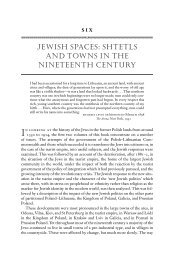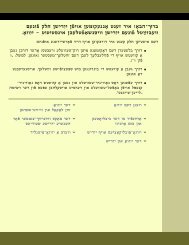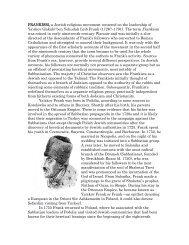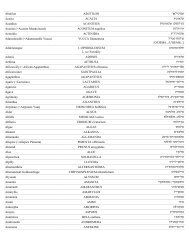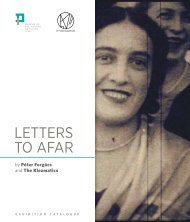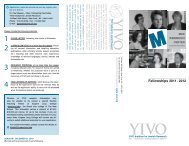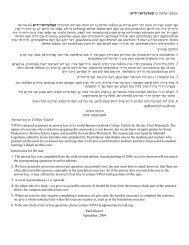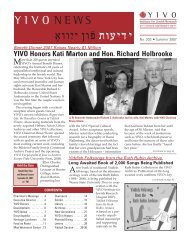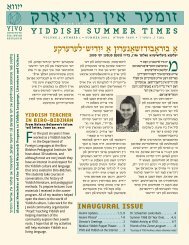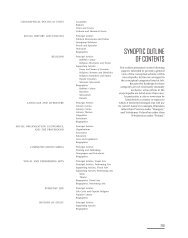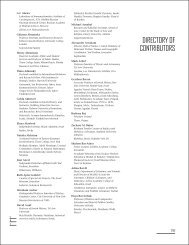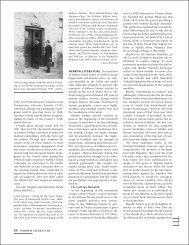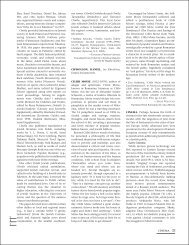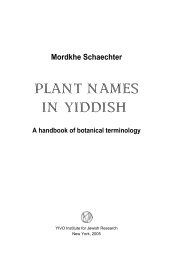geographical–political units - YIVO Institute for Jewish Research
geographical–political units - YIVO Institute for Jewish Research
geographical–political units - YIVO Institute for Jewish Research
You also want an ePaper? Increase the reach of your titles
YUMPU automatically turns print PDFs into web optimized ePapers that Google loves.
dailies Haynt and Der moment) to simplistic mass<br />
audience (Undzer ekspres, Radio), from the Orthodox<br />
Hasidic press to the Bundist Folks-tsaytung, which<br />
regularly published works of Yiddish and world<br />
literature. Warsaw’s literary life was colored by<br />
intense ideological and aesthetic debates about the<br />
relationships between politics and literature, high<br />
and popular art, nationalism and universalism.<br />
Vilna, a multicultural center of creativity in the<br />
Russian, Polish, Lithuanian, Belorussian, and Yiddish<br />
languages, became part of Poland as a result of hectic<br />
political bargaining in 1920–1921. The Vilna <strong>Jewish</strong><br />
community, although smaller than that of Warsaw,<br />
possessed a strong sense of Litvak identity that set it<br />
apart from the majority of Polish Jewry. There, <strong>for</strong><br />
the <strong>Jewish</strong> intelligentsia and middle class who were<br />
predominantly Russian speaking, Yiddish offered a<br />
viable <strong>for</strong>m of cultural identification in a new situation.<br />
Vilna became home to a number of cultural<br />
institutions of worldwide standing, such as <strong>YIVO</strong>,<br />
Hebrew and Yiddish teachers’ seminaries, the communal<br />
Strashun library, and the Kletskin press (the<br />
leading publisher of serious literature, which later<br />
relocated to Warsaw). The avant-garde poet Moyshe Lamtern in vint (Lantern in the Wind), by Itsik<br />
Kulbak turned into a cult figure among secular Manger (Warsaw: Farlag Turem, 1933). (<strong>YIVO</strong>)<br />
Yiddish-speaking youth, and his influence was felt<br />
long after he left Poland <strong>for</strong> the Soviet Union in 1928;<br />
the literary scholar and journalist Zalmen Reyzen single-handedly composed the comprehensive<br />
four-volume Leksikon fun der yidisher literatur, prese un filologye (1926–1930),<br />
which remains the main reference work on Yiddish literature <strong>for</strong> that period. Yung-<br />
Vilne, a loose association of modernist leftist writers, poets, and artists, had a great impact<br />
not only on Yiddish literature in Poland during the 1930s but also on the postwar<br />
development of Yiddish culture. Those of its members who survived the Holocaust—the<br />
poets Avrom Sutzkever, Perets Miranski, Elkhonen Vogler; the prose writers Chaim Grade<br />
and Shmerke Kaczerginski—became major cultural figures in Israel, Canada, France, the<br />
United States, and Argentina. Throughout the 1930s, Vilna, along with Warsaw, retained<br />
its position as the preeminent center of Yiddish scholarship. Whereas historical research<br />
flourished in Warsaw, it was Vilna, thanks to <strong>YIVO</strong>, that became the center of literary<br />
and linguistic studies, as well as of pioneering research in social psychology.<br />
The deteriorating economic and political situation in Poland throughout the 1930s and<br />
the rise of Nazism in Germany caused Yiddish authors, among them Manger, Nakhmen<br />
Mayzel, Molodowsky, Ravitch, and the Singer brothers to leave the country. As a result of<br />
the 1929 economic crisis, the Yiddish publishing industry went into a depression, <strong>for</strong>cing<br />
the Kletskin press into bankruptcy. As in the Soviet Union, the novel dominated Yiddish<br />
literature in Poland during the 1930s. Sholem Asch responded to the rise of antisemitism<br />
by turning to traditionalist themes in his monumental novel Der tilim-yid (The Psalm-<br />
Reciting Jew [translated into English as Salvation]; 1934), which presented an idealized<br />
image of a simple and righteous Jew. The novel was immediately translated into German<br />
11



